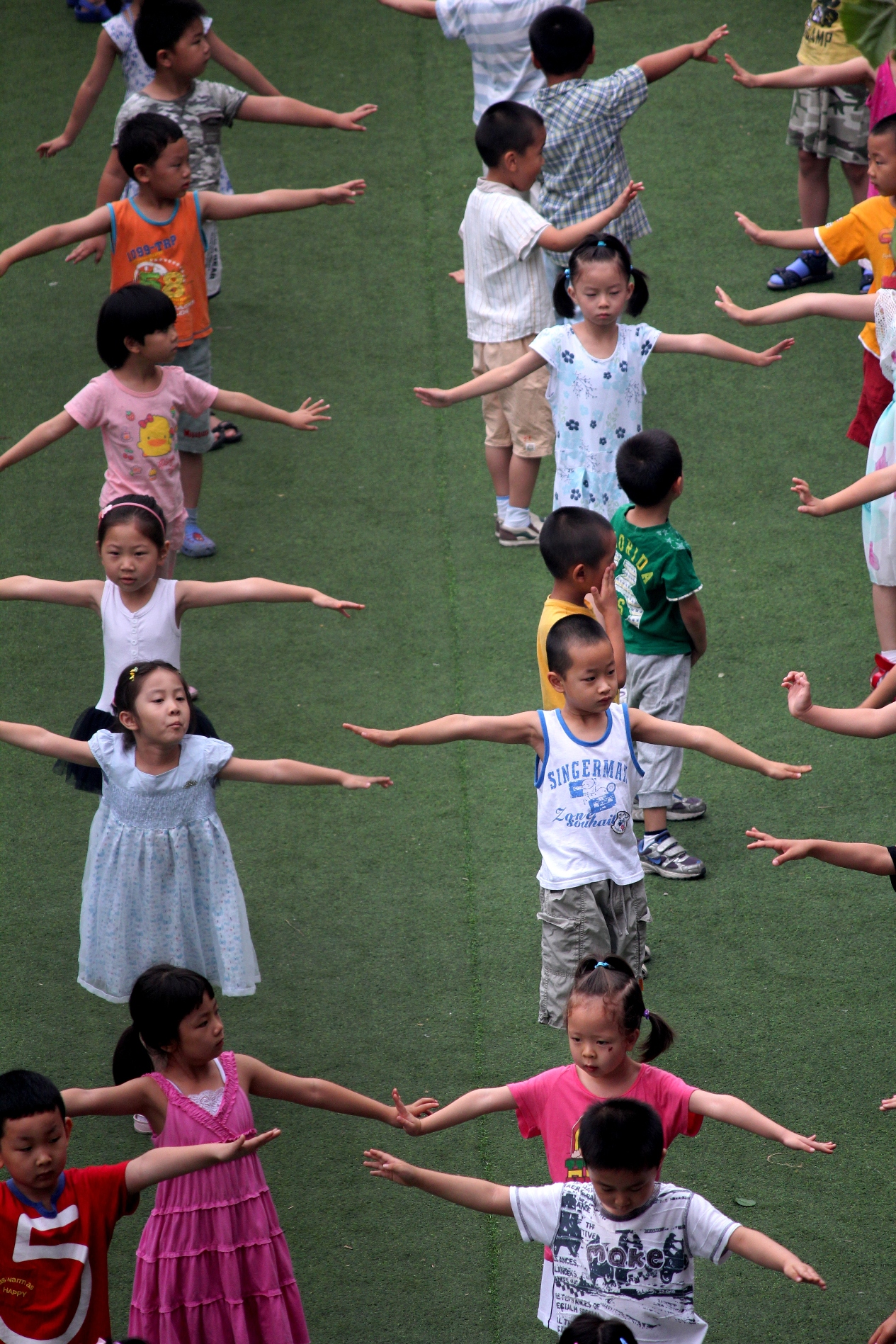
OPINION: Every weekday morning in Beijing, Shania Twain wakes me up.
Leave Me Breathless is the song of choice, but before you get any ideas about me having programmed the country queen’s tunes into my iPod, let me explain.
My fourth-floor studio apartment overlooks the courtyard of a kindergarten, where the school day starts at 7.50am with group exercises.
A hundred or so youngsters line up and, following the directions of their teachers at the front, move along to music, which blares over loud speakers. There’s stamping of feet, faux kung fu moves and swaying of hips, and although the choreographed routines sometimes vary, my morning backing track does not.
Although no top 40 hits featured in Zhang Yuan’s 2006 movie Little Red Flowers, set at a kindergarten boarding school in post-revolutionary China, I had a chuckle when one scene depicted regimented group exercise to music.
With the vast majority of the cast being four and five year olds, you can expect a few laughs and cute moments, whether intended by the director or not; however, this doesn’t soften the message of Zhang’s poignant reflection on the struggle for self-expression and individual freedom in a culture that values and rewards conformity above all else.
In 1994, Zhang’s gritty, unflattering portrayals of Chinese life struck a nerve with local authorities and he was banned for a time from film making. So with Little Red Flowers, Zhang adopts a subtler storytelling technique to comment on a wider political and social context.
Loveable hero
The loveable hero is four-year-old Qiang, who in the film’s opening scene is unceremoniously deposited at a live-in kindergarten for children from Communist Party families. Here, life is highly regimented and good habits are rewarded with coveted red crepe-paper flowers.
But feisty Qiang can’t adapt to the imposed rules and regulations – and who can blame him for not acquiring “the good habit to pooh in the mornings” on demand? - and revolts against them.
Film club facilitator Ruby Li has had personal experience of the Chinese education system and the pressure to conform, and said it is only one of the ways the state sought to curb individual freedoms.
“When I was in kindergarten we had this little red flower system too, we had to try so hard to obey those ridiculous rules to pee on time, things like that. But in this movie it is metaphorical for all those rules that tear apart personalities - like birth control.”
Last week, the state-owned China Daily newspaper, where I am interning, ran a feature on the popularity of Rudolf Steiner education among some in China’s rapidly rising middle class.
I doubt poohing-on-command is part of the Steiner philosophy, but some of the comments made by parents and teachers in the story made me wonder how much things have changed within the state-run system since the era portrayed in Little Red Flowers.
“I didn’t see her learning anything interesting or inspiring at school. I felt like we were preparing for battle every morning because we would have to hurry to the school to be on time for the morning reading of the classical Di Zi Gui (Standards for Being a Good Student), which, I think, is too obscure for young children.
"I don’t understand why a child is made to feel so competitive at just 7,” said Zhang Tiange, who recently ditched the state-run model and enrolled her daugher in a Steiner school.
Unique personality
Another parent, Cao Lili, said of the Steiner school “They also value each child’s unique personality, unlike public kindergartens.”
While teacher Zheng Juanrui said “Students are not manufactured like assembly-line products.”
During my time in Beijing I have met a number of expat parents, with children who, I have no doubt, represent the best of our world’s future. These kids, primary school-aged and below, typically speak two, sometimes three, languages: Chinese, English and the native tongue of one or both of their parents.
At one six-year-old’s birthday party in Beijing’s leafy Chaoyang Park, I listened to a set of parents who were in a quandary over whether to fork out big bucks for private kindergarten and primary school education, or have faith the results-driven, “assembly-line” state system wouldn’t completely knock their kid’s creative ability to think outside the square.
Of course, for the majority of Chinese parents there is no debate.
Life in China is competitive and I get the feeling there are no second chances. Children start in a highly-regimented education system because that’s how they must continue. Only the top students secure places in university and failure to do so often means a life of factory work.
I was teasing a colleague the other day about his lack of a misspent youth. He honestly replied that his focus was his studies. Teachers fostered his obvious talent by allowing him a unique live-in arrangement at his regional high school, and it paid off. He secured a place at a prestigious Beijing University and, from there, a good job that sponsors his residency in the capital city.
His parents are migrant workers, many of his childhood friends, factory workers.
Brick in the wall
I don’t blame most of my local peers for submitting to being just another brick in the wall. I wonder though, if they are able to ever really shake off the shackles of routine.
My life in Beijing runs to a tight itinerary, one that I have adopted from my work colleagues.
Obviously, there is Shania in the mornings, followed by a spoilt–me-for-Auckland-commutes three minute walk to my office.
As if someone has rung a bell, at 11.30am everyone heads to the work canteen, reminiscent of a military mesh hall, for lunch and then usually it’s back to the office for a snooze (actually!) or an internet browse before I clock back in at 1pm.
Although the official work day ends at 5.30pm, the company organises evening sports: badminton on Mondays, basketball on Tuesdays, tennis on Wednesdays, billiards or yoga on Thursdays…you get the idea, and I have become a regular badminton player and remembered why I don’t like yoga.
Add to this regime canteen breakfasts and dinners, which I generally opt out of, and the fact that many workers live in apartments within the company compound, and you can see my point.
I chatted with a Chinese tour guide last week, who for the past two years has been escorting intrepid western travelers on small group tours through China. She told me her travelers often comment that China is “very different from what they expected from the news and stories back home”.
When pushed for an example, she said: “They are glad to see how happy Chinese people are.”
Likewise, I do not want to give the impression that I am surrounded by dull, robotic androids. I am constantly inspired by the hospitality, intelligence, vibrancy and civic-mindedness of the Chinese people I interact with on a daily basis.
And I hate to admit it, but every morning Shania makes me smile, and more importantly she makes the lines of preschoolers outside my window smile. Who are we to judge?
China Through Cinema
Reporter Kim Bowden reviews a series of films as she attends the "China Through Cinema" events. She provides a glimpse into life in Beijing, a rapidly evolving city with an incredible history. Today she discusses Zhang Yuan's 2006 movie Little Red Flowers.



